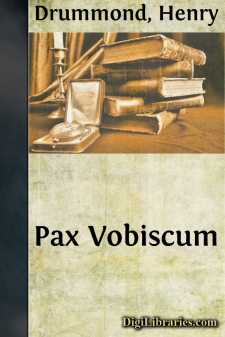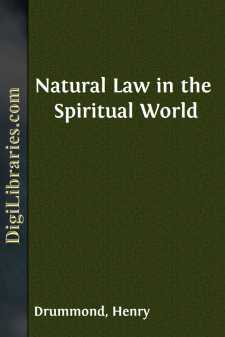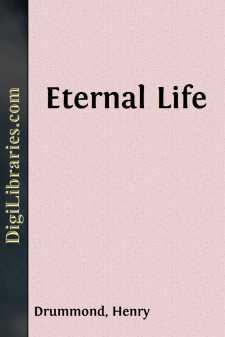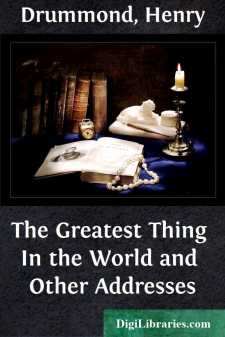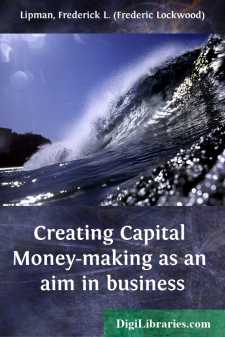Categories
- Antiques & Collectibles 13
- Architecture 36
- Art 48
- Bibles 22
- Biography & Autobiography 813
- Body, Mind & Spirit 142
- Business & Economics 28
- Children's Books 15
- Children's Fiction 12
- Computers 4
- Cooking 94
- Crafts & Hobbies 4
- Drama 346
- Education 46
- Family & Relationships 57
- Fiction 11828
- Games 19
- Gardening 17
- Health & Fitness 34
- History 1377
- House & Home 1
- Humor 147
- Juvenile Fiction 1873
- Juvenile Nonfiction 202
- Language Arts & Disciplines 88
- Law 16
- Literary Collections 686
- Literary Criticism 179
- Mathematics 13
- Medical 41
- Music 40
- Nature 179
- Non-Classifiable 1768
- Performing Arts 7
- Periodicals 1453
- Philosophy 64
- Photography 2
- Poetry 896
- Political Science 203
- Psychology 42
- Reference 154
- Religion 513
- Science 126
- Self-Help 84
- Social Science 81
- Sports & Recreation 34
- Study Aids 3
- Technology & Engineering 59
- Transportation 23
- Travel 463
- True Crime 29
Pax Vobiscum
by: Henry Drummond
Description:
Excerpt
PAX VOBISCUM
I heard the other morning a sermon by a distinguished preacher upon "Rest." It was full of beautiful thoughts; but when I came to ask myself, "How does he say I can get Rest?" there was no answer. The sermon was sincerely meant to be practical, yet it contained no experience that seemed to me to be tangible, nor any advice which could help me to find the thing itself as I went about the world that afternoon. Yet this omission of the only important problem was not the fault of the preacher. The whole popular religion is in the twilight here. And when pressed for really working specifics for the experiences with which it deals, it falters, and seems to lose itself in mist.
The want of connection between the great words of religion and every-day life has bewildered and discouraged all of us. Christianity possesses the noblest words in the language; its literature overflows with terms expressive of the greatest and happiest moods which can fill the soul of man. Rest, Joy, Peace, Faith, Love, Light—these words occur with such persistency in hymns and prayers that an observer might think they formed the staple of Christian experience. But on coming to close quarters with the actual life of most of us, how surely would he be disenchanted. I do not think we ourselves are aware how much our religious life is made up of phrases; how much of what we call Christian experience is only a dialect of the Churches, a mere religious phraseology with almost nothing behind it in what we really feel and know.
To some of us, indeed, the Christian experiences seem further away than when we took the first steps in the Christian life. That life has not opened out as we had hoped; we do not regret our religion, but we are disappointed with it. There are times, perhaps, when wandering notes from a diviner music stray into our spirits; but these experiences come at few and fitful moments. We have no sense of possession in them. When they visit us, it is a surprise. When they leave us, it is without explanation. When we wish their return, we do not know how to secure it. All which points to a religion without solid base, and a poor and flickering life. It means a great bankruptcy in those experiences which give Christianity its personal solace and make it attractive to the world, and a great uncertainty as to any remedy. It is as if we knew everything about health—except the way to get it.
I am quite sure that the difficulty does not lie in the fact that men are not in earnest. This is simply not the fact. All around us Christians are wearing themselves out in trying to be better. The amount of spiritual longing in the world—in the hearts of unnumbered thousands of men and women in whom we should never suspect it; among the wise and thoughtful; among the young and gay, who seldom assuage and never betray their thirst—this is one of the most wonderful and touching facts of life. It is not more heat that is needed, but more light; not more force, but a wiser direction to be given to very real energies already there....


